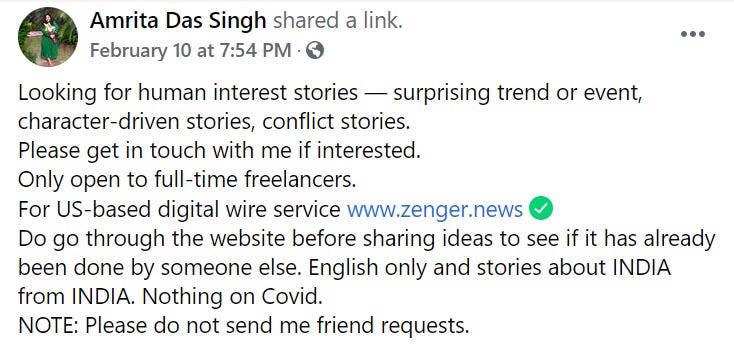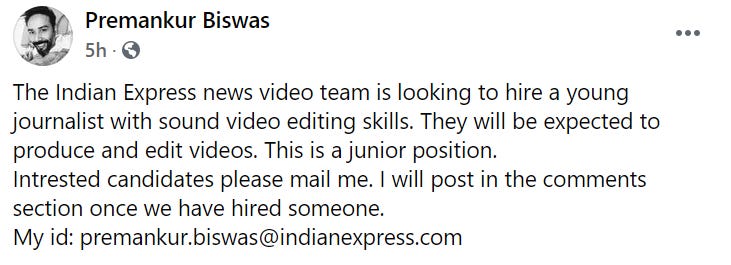Being a freelance journalist may look lucrative as it gives you the ownership of your time, freedom to choose what you want to write on, and be your own boss, it's no surprise that it takes time to settle into it as a sustainable career option.
If you've taken the plunge, or are planning to, here's a basic guide to help you.
- Be coherent: Irrespective whether you're e-mail pitching to publications or gearing up for the weekly editorial meeting, always flesh out your idea to get it pitch-ready. There is a difference between presenting an idea and presenting a pitch. While an idea can be a starting point—a seed—to a story, the pitch must always have a clear flow, the angle(s) being covered, the planned format, and the hook of the story (why will readers read your story). Charu Kasturi, the Bangalore-based Senior Editor in charge of all of OZY’s international (non-US) coverage emphasizes this too in this newsletter.
- Be focused: It works better when you have a clear and to-the-point headline to your pitch; a working headline. This helps in having a focused impact on commissioning editors who immediately telling them what they are working with.
- Shape your pitch: There is no one-size-fits-all solution to pitching stories. If you have a story idea, don't just blindly pitch it to publications. Your pitches are likely to get accepted when the angle you're covering and the tonality/voice of your pitch is aligned with that publication. It's a good idea to acquaint yourself with the nature of publications you're approaching.
- Research your story's journey: It's a great practice to do a thorough background check on your idea. What publications have already covered it (you don't ever want to send a story idea to a publication that has already carried similar stories), what angles have been explored, and if your angle is unique and fresh, or not.
- Be consistent: Pitching is not a task on your checklist, it's a process. A process that gets better with time—a classic 'practice makes perfect' thing. Vidya Balachander's (a food and travel journalist and editor) tip on pitching stories as given in Joanna Lobo's It's All Write Newsletter is: the more you pitch, the easier the process is likely to be. Pitching often strengthens your confidence in your voice and in your story and makes the rejections sting less.
- Basic checks and balances: Staying communicative with your editors, respecting deadlines, and delivering what you have promised are some things to keep in mind.
- Why you? It can be helpful to let an editor know why you're the right person to be telling the story. Do you have unique access? Do you have a history of reporting on similar topics? Do you have additional skills like video, photography or data visualisation? This additional information could help push an editor's decision in your favour. This video breaks it down in more detail.
Resources/Reading Material to Gain More Insights on Pitching Stories
- Neiman Story Boards' The Pitch has a lot of reading material that will help you improve your pitches.
- Joanna Lobo's Newsletter—It's All Write is a regular supply of insights and tips from industry experts on pitching to publications in India and abroad. She also regularly compiles open positions, pitching opportunities and other leads for stories.
- The Open Notebook's Pitch database collates successful pitches with the resulting published story across a variety of publications.
- Freelance Journalist Samarth Bansal has documented all his learning as he made the transition from full-time employment to a freelance career. It has some very critical personal insights and answers all the important questions of a freelancer's life.
- Joanna Lobo lists her 10 commandments for freelancing in India.
- Akanksha Singh, a Mumbai-based freelance journalist has also compiled a handy guide of resources that includes resources to pitch to publications globally, some sample pitches, and a list of places where you can find opportunities.
- IndiaInk's page on Resources for Freelance Journalists is also a good page to bookmark.
- Who Pays Writers gives you a reasonable sense of what rates different publications pay. Even you can submit how much you've been paid to help other journalists. They have some Indian publications too.

- US-based digital wire service Zenger is looking for pitches:

- The Indian Express is hiring:

Penguin Random House India is looking for freelancers and for Junior Copy Editor/Junior Editor:


ABOUT THIS NEWSLETTER
This newsletter is an attempt to keep up and share all the latest and greatest stories in media and how they get done. Read about it here: About In Old News-Letter. And if you were forwarded this newsletter, here’s how you can sign up to get the latest editions as they come out!

